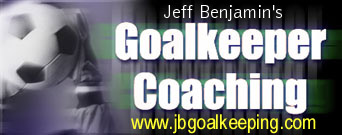
|
"Outstanding keeper instruction. This is a must for goalkeepers and coaches." —Ottawa Internationals S.C. web site, Ottawa, Canada |

|

|
Top |
Goalkeeping Tips, Tidbits and Random Thoughts
An athlete talking to themsleves during competition is hardly a new phenomenon.... The talk does not have to be vocal. By merely thinking you are talking to yourself and sending a message.
-- Tony DiCicco, Goalkeeper Soccer Training Manual
If you have a question, comment or rebuttal you'd like to see addressed here, send me email. I will post your mail to the blog at my discretion unless you specify otherwise.
When to come off the line
I often get asked, "When should the goalkeeper come off the line?" when dealing with a breakaway? I think the question is the wrong one to be asking first, but there are a few clues to help time when to charge off the line.First, when the attacker has the ball under close control and has the option of taking a shot, the goalkeeper should be as close to the ready position — feet set and not moving — as possible. The time to steal ground is when the ball is away from the attacker's foot, so time your break just as the attacker touches the ball forward.
Second, don't just focus on the ball; watch the shooter's body and use those clues as well. Another cue to come out further is when the attacker puts their head down to focus on the ball (as long as it doesn't look like they're shooting). If you're quick you can close the gap almost completely, and by the time the attacker looks up, the keeper is in their face and there's nowhere to shoot.
However, be aware that the combination of head down/leg back means the attacker is ready to take a shot, and the keeper must immediately stop and set for it.
Reading body language comes from experience, but a little instruction can help players learn to detect the cues faster. I will often have keepers sit behind the goal and watch as myself or another player dribbles, runs and shoots, and have them shout out what they think I am about to do, or what they would do: "Shot!" "Ready!" "Close down!" It allows them to focus on reading the attacker without having to worry about being able to make the save.
Learning what to look for is just as important as learning the physical skills.
Labels: Breakaways
Focus on the process, not the outcome
On the Guardian Unlimited Football site, a recent article discusses which goalkeepers have given up the most goals in the English Premier League. Of course, the keepers listed are all top-notch. Conceding goals is as much a function of the team and defense in front of the keeper as well as the quality of the competition.This is what makes goalkeeper such a mentally tough position. No matter how many spectacular saves the keeper makes, one mistake will be remembered. And the ball will eventually end up in the back of the net.
Thus the importance of focusing on the positives and on process goals, not outcome goals. Outcome goals are typically out of the control of the player: Did they score? Did we win? Process goals look at the details and what is in the control of the player: Was my footwork solid? Did I take that step and dive forward at the angle? Did I use the correct hand to parry the ball? Even if there is a correction to be made, focus on that correction rather than the fact that the goal was scored. And give the keeper credit for the positive things they do as well as correcting the negatives.
Of course, this positive approach should be used with all players. But it's especially important for goalkeepers, who play a position where failure is a regular part of the regimen.
Labels: Psychology